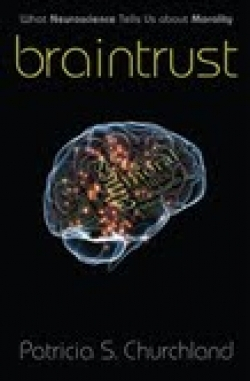Braintrust
What Neuroscience Tells Us About Morality
Philosophers and theologians are well acquainted with navigating the murky waters of good and evil, and with trying to create definition around what’s “right” and “wrong.” Into this much-traveled sea comes a different type of sailor with a fresh perspective: Patricia Churchland, a well-known philosopher with an interest in neuroscience, tackles the issue of morality not from a religious or purely philosophical framework, but from one that takes the brain’s circuitry into account.
Author of Brain-Wise and Neurophilosophy, Churchland is professor emerita of philosophy at the University of California, San Diego, and an adjunct professor at the Salk Institute. Throughout her academic career, she’s focused on the intersection of philosophy and neuroscience, and has argued that as the nature of brain function becomes more known, psychology and philosophy will have to adjust to new information about the mind.
In this compelling work on morality, she brings those threads together with passion and elegance, using neuroscience research as a basis to explore the types of evolutionary pressures and cultural values that have formed approaches to moral behavior.
She notes that moral values tend to be rooted in family values and are common to all mammals, but that human brain chemistry involves unique processes that have further shaped how people interact with one another. “Advances in the biological and social sciences have made it possible to explore in earnest the connections between morality and the evolution of the mammalian brain that produced ‘the family way of life,’ and therewith, the wellspring of care and compassion that shapes the moral geography,” she writes.
Churchland guides the reader through lucid, well-articulated explanations of subjects like oxytocin’s effect on an individual’s hormonal makeup, brain changes over time, and relevant gene research, tying these neuroscientific elements together with more social science-oriented areas like cooperation, trust, and rule creation. In her conclusion, she looks at religion’s role in shaping moral behavior.
In bringing together aspects of philosophy and neuroscience, Churchland presents a persuasive argument that morality is not shaped solely by religious or social forces but, instead, also draws on hormonal triggers, genes, and brain evolution. This influential work is likely to be a valuable resource for anyone seeking to gain a fresh, exciting perspective on an oft-discussed area of philosophy.
Reviewed by
Elizabeth Millard
Disclosure: This article is not an endorsement, but a review. The publisher of this book provided free copies of the book to have their book reviewed by a professional reviewer. No fee was paid by the publisher for this review. Foreword Reviews only recommends books that we love. Foreword Magazine, Inc. is disclosing this in accordance with the Federal Trade Commission’s 16 CFR, Part 255.

